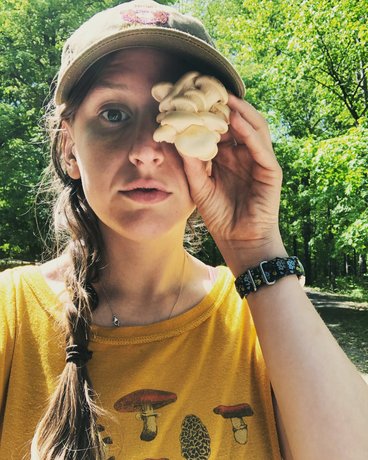
Can you tell us a little bit about yourself?
My name is Becca and I’m the Instructional Support Specialist and Outreach Coordinator for the department, which means I organize and teach many of our lab courses and develop outreach opportunities. I have been working in this position since the spring of 2020 and am a recent graduate of the department.
How did you get involved with plant pathology as a discipline?
I grew up hunting for morel mushrooms with my father and grandfather every spring, so I’ve had an interest in fungi since a young age. My senior year of high school, I took an environmental studies course where we spent a lot of class time in the woods near our school making observations. I decided to pick up a mushroom identification book and see what all I could find, matching the fungi I found to photos in the books. It was the first time I really started noticing mushrooms for their beauty, besides those to eat.
After high school, I attended Clarion University of Pennsylvania to become a high school biology teacher. At Clarion, mycology was offered as an elective and it was where I truly fell in love with the world of fungi. My mycology professor and mentor approached me with the opportunity to complete an undergraduate research project comparing the biodiversity and heavy metal composition of basidiomycete mushrooms found in sites of acid mine drainage. After this experience, I knew that I wanted to pursue a career working with fungi instead of teaching in a high school setting. My mentor had a degree in plant pathology and encouraged me to explore the discipline as it tends to be a more applied and better funded field of science. She then helped me apply to a plant pathology summer undergraduate research assistantship at Cornell University.
Tell me about a specific moment in your life that made you decide to pursue a career in Plant Pathology?
My internship at Cornell. My project during this internship was studying the mechanisms of fungicide resistance of grape powdery mildew. The summer scholars program is a nine-week program in which undergraduate students conduct research and present their findings at a poster session at the end of the summer. It is essentially a crash course of what a graduate student research assistantship is like and definitely prepared me for my time pursuing my master’s degree.
What has been the most rewarding moment of your career so far, and what led to that moment?
Seeing students from my classes become interested in a future in plant pathology and pursuing a graduate degree in the discipline. Depending on the semester and enrollment, I can have up to eighty students in my courses each semester. I have a shared goal with the faculty I teach with to hopefully convince a few students to think about a future in plant pathology.
What do you enjoy most about the department of plant pathology?
The culture. I feel so lucky to be a part of a department that is filled with such passionate and caring individuals. While we are a small department, we are mighty in the impact that we have on our community and ecosystem as a whole.
Can you describe how being part of this department has helped your mission as a scientist?
I have had nothing but support from the department for all of my crazy ideas. Even when I was a graduate student with plans for outreach or social events through the plant pathology graduate student organization. I am incredibly fortunate to have found a position that allows me to teach and share my love of fungi.
Can you tell us about your plans for the future?
To continue to inspire students in our lab courses to be interested in the field of plant pathology. I also have many plans for outreach programs in the future and ideas for videos in the works. Stay tuned. :)
